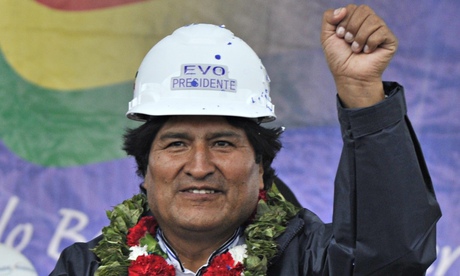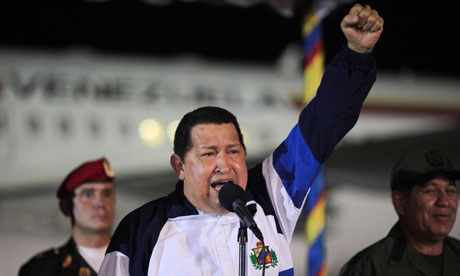Bolivia has become the first country in the world to actually give nature legal rights in a huge effort to put a halt to not only climate change but the exploitation of our world, and in turn improve the quality of life for the people of Bolivia.
Our Mother Earth looks to Bolivia as they spearhead new economic and social models based on the protection and preservation for nature.
This idea had been developed by grass root social groups that presented their ideas to politicians and were accepted as one. In doing so, the Law of Mother Earth in Bolivia recognizes the rights of all living beings, whether they be plant or animal. This law gives our world equal status to human beings.
When this law is fully approved, this legislation will then provide the Earth with the rights to life and regeneration; liberation from genetic modification and biodiversity; naturally balanced systems, pure water and clean air; complete restoration from the effects of its human activity; and freedom from the continual contamination on all fronts.

The prioritising of this legislation based on broader principles of looking towards living in harmony side by side with the Earth and moving towards the collective good of all. At the core of this legislation is a full understanding that the Earth is sacred, which comes from the indigenous people called Andean, viewing the world as ‘Pachamama’ which translates to Mother Earth a living being.
Back in December 2010 the initial act had already outlined the rights of the earth as a dynamic and “indivisible community of all living systems and living organisms, interrelated, interdependent and complementary, which share a common destiny.”
With the Law of Mother Earth Bolivia’s government would then be legally bound to ensure the prioritising of not only the natural world’s policies and making sure that they are promoting sustainability and controlling industry, but making sure they have the wellbeing of its citizens and the world are at their heart.
The economy of Bolivia will be looking to operate within the limits of nature as they push towards a renewable green food stability and energy efficient technologies. Helping to prevent the drastic climate changes already taking place, ensuring that the future generations have brighter lives and a more hopeful future.
The Bolivian government is also requesting a call to arms with other rich countries to work together in adopting the recognition of the effects of climate change due to their high carbon emissions. According to an Oxfam report in 2009, Bolivia is particularly susceptible to the impacts of climate change with increasing drought, flooding and melting glaciers.
On the stage international change, the Bolivian government will have a duty to help promote the upkeep of the rights of Earth, while becoming advocates of not only peace but the elimination of all nuclear, chemical and biological weapons.
Following the change to the Bolivian constitution back in 2009, the law will play a large part of overhauling the legal system. It helps represent a strong shift away from the universally adopted western development model to a much greener holistic vision, based on the concept of Vivir Bien meaning ‘to live well’.
The proposal for the new law brightly states:
“Living Well means adopting forms of consumption, behaviour and conduct that are not degrading to nature. It requires an ethical and spiritual relationship with life. Living Well proposes the complete fulfilment of life and collective happiness.”
An umbrella group for five different Bolivian social movements called the Unity Pact helps prepare the draft of the new law. The represent and speak for over 3 million people of the countries 36 different indigenous groups, the majority of them are small scale farmers who still call their ancestral lands home. The bill helps to protect not only their livelihoods but the diverse cultures that feel the immense impacts of the large industries.
One of the leaders of the social movement Confederación Sindical Única de Trabajadores Campesinos de Bolivia Undarico Pinto, states that “It will make the industry more transparent. It will allow people to regulate industry at national, regional and local levels,” helping to signify a large shift away from the exploitation of nature.
The draft laws that refers to the mineral resources of the world as “blessings” and goes further and states that Mother Earth, “is sacred, fertile and the source of life that feeds and cares for all living beings in her womb. She is in permanent balance, harmony and communication with the cosmos.”
Bolivia will also establish a Ministry of Earth to promote their new rights and make sure that they are all complied with. yet the economy of Bolivia is at this moment solely dependent of the exports of natural resources, earning almost a third of its foreign currency which averages around £300m a year from multiple mining companies. Bolivia is looking to create a new balance and obligations against the demands of that industry.
Bolivia Rain forest

Within the next few months, the full law is expected to pass and it is very unlikely to face opposition due to the ruling party, The Movement Towards Socialism, has been able to hold a considerable majority in their parliament. President Evo Morales, its leader, voiced a commitment to what they were creating at the World People’s Conference on Climate change that was held in Bolivia back in April 2010.
The Law of Mother Earth includes the following:
The right to maintain the integrity of life and natural processes.
The right to not have cellular structure modified or genetically altered.
The right to continue vital cycles and processes free from human alteration.
The right to pure water.
The right to clean air.
The right to balance, to be at equilibrium.
The right to be free of toxic and radioactive pollution.
The right to not be affected by mega-infrastructure and development projects that affect the balance of ecosystems and the local inhabitant communities
This law pushes the world “harmony and peace” with “the elimination of all nuclear, chemical, and biological weapons.”



